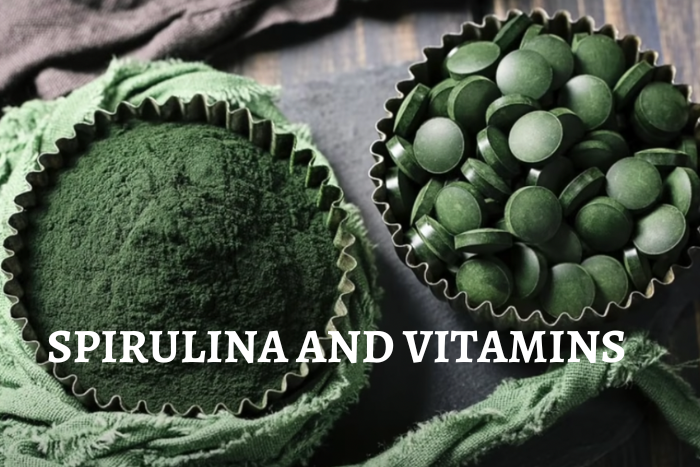
Spirulina and vitamins are great topics because Spirulina is the source of vitamins, minerals, enzymes, proteins, and essential amino acids. Spirulina is a valuable food supplement. Vitamins take part in metabolism, the immune system, and digestion activities. Without vitamins, our body would be thrown off balance and could not function properly.
Spirulina contains several vitamins which are essential to metabolic processes.
Spirulina and vitamins
Pyridoxine or B6
Pyridoxine helps break down and assimilate proteins. Dr.Carl Pfeiffer stated that vitamin B6 and the mineral zinc could contribute to healing some forms of schizophrenia.
Vitamin B6 protects cardiac health, helps reduce edema, and stabilizes female hormone levels.
Biotin
Biotin is a water-soluble vitamin. This vitamin is called vitamin B7 or coenzyme R.
Biotin is essential for the growth of cells, the production of fatty acids, and the metabolism of amino acids and fats.
Biotin takes part in carrying CO2 during biochemical reactions. Biotin is necessary for nails and hair production.
Cobalamin or B12
Vitamin B12 is water-soluble, and it is rare to be found in vegetables. Thankfully, Spirulina is rich in cobalamin or so-called vitamin B12.
Vitamin B12 plays a significant role in the functions of the brain and nervous system, the formation of red blood cells, in the metabolism of fatty acids and amino acids.
If humans lack Cobalamin in their bodies, they can feel fatigued. Mental illnesses can develop, such as schizophrenia.
Pantothenic acid or B5
Pantothenic acid, or vitamin B5, is a part of the vitamin B complex. Pantothenic acid takes part in the synthesis of coenzyme-A, proteins, fats, and carbohydrates.
According to Jack Joseph Challem, the author of Spirulina: What it Is…the Health Benefits it Can Give You, pantothenic acid is a stress vitamin. When the body lacks this vitamin, fatigue, infections, and degenerative diseases like arthritis and rheumatism could occur.
Ulcers and hypoglycemia are associated with the absence of pantothenic acid.
Folic acid
Folic acid participates in the formation of hemoglobin in red blood cells. If the body lacks folic acid, anemia, weak growth, and premature graying of the hair occur. There is shortness of breath, heart palpitations, and open sores on the tongue due to the lack of folic acid.
Humans can not produce folic acid. They need to get vitamin B from the diet.
Inositol
Inositol is the essential lipotropic nutrient. Lipotropic means a compound that accelerates the breakdown of fat during metabolism in the body.
Inositol sustains liver health and helps detoxify carcinogens, according to Jack Joseph Challem.
Niacin or B3
Niacin, or vitamin B3 is essential for mental health. Dr. Abram Hoffer, co-developer of Orthomolecular Medicine, has relieved symptoms of schizophrenia with niacin.
According to Wikipedia, the lack of niacin can cause nausea, anemia, headaches, and tiredness.
Niacin deficiency can show up as decreased cold tolerance and skin conditions such as dermatitis and hyperpigmentation.
Riboflavin or B2
Riboflavin is necessary for healthy vision and skin health.
Thiamine or B1
Thiamine is essential for maintaining levels of glucose in the blood. If the body lacks thiamin, humans can feel tired. Neurological and cardiovascular diseases occur when the body is deficient in thiamin.
Tocopherol or vitamin E
Spirulina contains plenty of vitamin E. The algae contain more vitamin E compared with wheat germ.
Vitamin E, or tocopherol, is famous for protecting the heart and vascular health. The deficiency of vitamin E can cause anemia and neurological problems.
Spirulina has enormous nutritional value because it contains the most vitamins, minerals, and enzymes the body needs. Spirulina is easily digested and does not have any side effects. Spirulina and vitamins are the real things that work for our benefit.